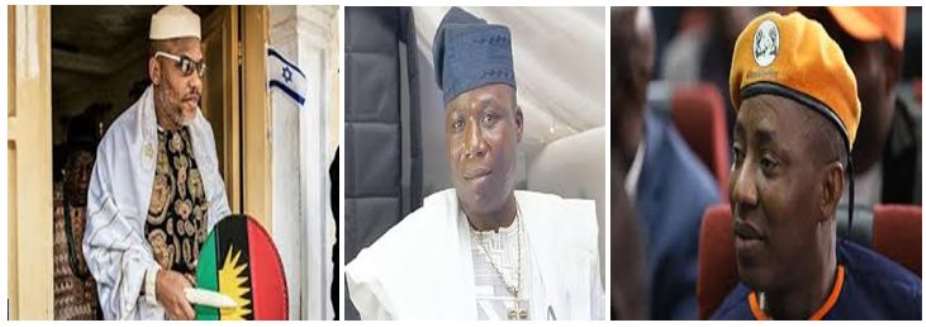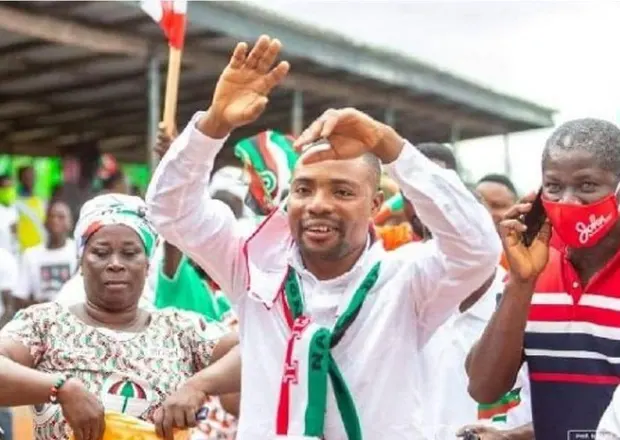President Bola Tinubu, in the spirit of national reconciliation and justice, Nigerians urge you to reassess Nnamdi Kanu's detention. This psychologist, along with many conscientious Nigerians, expresses strong disapproval of the inflammatory and terror-oriented rhetoric espoused by Nnamdi Kanu, the leader of the Indigenous People of Biafra (IPOB).
Barrister Aloy Ejimakor, Kanu's legal representative, has shed light on the recent progress in Kanu's legal saga. In a court session held in Abuja, presided over by Justice Binta Murtala-Nyako, the court signaled its willingness to be open to reconciliation efforts. It did so by indicating that both sides should keep the Attorney-General of Nigeria, Lateef Fagbemi, apprised of their intentions and any developments in their discussions. This judicial overture underscores a commitment to promoting dialogue and peacefully addressing the contentious matters at stake, with the hope of reaching a political resolution that could alleviate the underlying issues and strains between IPOB and the Nigerian government. Justice Murtala-Nyako cited Section 17 of the Federal High Court Act, which allows the court to promote reconciliation among parties and advocate for peaceful resolutions. This legal foundation supports the court's actions.
The federal government's legal counsel, Ademoyega Awomolo (SAN), expressed openness to a political settlement and suggested that Kanu's legal team engage directly with the Attorney-General of the Federation. Similarly, Kanu's lead counsel, Ejimakor, showed a willingness to explore a political settlement. The court's openness to reconciliation is a significant step toward resolving the conflict between IPOB and the Nigerian government, reflecting a judicial approach that seeks peaceful resolution over adversarial trials.
Ejimakor emphasized that Section 17 of the Federal High Court Act provides for amicable resolution. He informed the court of his team's decision to explore this option after filing two applications—one against the Director General of the DSS and another challenging the court's jurisdiction. He stated that if the applications were dismissed, he would have no choice but to activate Section 17 for reconciliation and settlement.
Despite their different ethnic backgrounds and distinct goals, Igboho, Sowore, and Kanu all face charges related to terrorism and threats to national security. This commonality underscores broader issues of ethnic agitations, government responses, and the quest for political solutions to these long-standing conflicts. Omoyele Sowore and Sunday Igboho, who faced similar charges, are now free, with no further prosecution from the current administration led by President Tinubu and his Attorney-General, both Yorubas. However, Kanu, an Igbo man, remains prosecuted. This disparity starkly represents ethnic, tribal, and cultural prejudice, social injustice, and unequal treatment at its highest. Treating Kanu's detention similarly to Buhari's house arrest could be a significant step toward de-escalation and dialogue.
Nnamdi Kanu has endured significant suffering and hardship while in custody, raising grave concerns among his supporters and human rights advocates. Allegations suggest that the DSS has at times denied him access to visitors and subjected him to conditions that endanger his health. The proposal to place Kanu under house arrest in GRA Benin City, or any other city, as was done to Buhari, reflects a humane approach to balancing security needs with compassionate treatment. Alternatively, he could be given the option to return to Britain, recognizing his dual citizenship with Nigeria and Britain.
The emotional and human rights dimensions of these cases demand a compassionate response. By addressing Kanu's situation with the same fairness extended to Igboho and Sowore, we not only honor our commitment to justice but also pave the way for a more peaceful and inclusive society.
The situation involving Major General Muhammadu Buhari's detention in 1985 after being overthrown by General Ibrahim Babangida provides a historical precedent relevant to Kanu's case. Buhari's detention involved house arrest in a guarded bungalow in Benin City, with limited access to television and controlled family visits. Applying a similar approach to Kanu could create an environment conducive to reflection and potential rehabilitation. This method ensures his safety and the nation's security while addressing the legitimate concerns of all parties involved.
President Bola Tinubu, known for protesting against military rule and advocating for democracy, embodies the democratic spirit and principles of fairness and justice. Recognizing the democratic fervor shared with Nnamdi Kanu, despite differences in methods, is crucial. The call for Tinubu to follow the judge's openness and engage in a political solution via the Attorney-General of the Federation and Minister of Justice, rather than allowing Kanu to suffer or potentially die in DSS custody, is a plea for compassion and statesmanship. It highlights the responsibility of leadership to ensure the welfare and dignity of all citizens.
Culturally, it is outrageous that Kanu, an Igbo man, is not receiving the same fairness from President Tinubu and the Attorney-General of the Federation, both of whom are Yoruba. This is especially infuriating given that Sunday Igboho, a Yoruba-born activist, was allowed to return to Nigeria during their administration after fleeing during Buhari's regime. The blatant disparity in treatment between Adeyemo and Sowore compared to Kanu underscores a shocking level of ethnic bias. If these two Yoruba-born activists, arrested for treasonous offenses, can be granted leniency or freedom, it is an egregious injustice that the same fairness is not extended to an Igbo activist like Kanu.
The unequal treatment of Kanu compared to Sowore and Adeyemo, who have been allowed freedom without further prosecution under your administration, underscores the ethnic, tribal, and cultural prejudice, social injustice, and unequal treatment at its highest. These three men were bitterly pursued by Buhari, a former military despot who later became Nigeria's president and Tinubu's predecessor, but Tinubu, a known democrat and also a man with a history of civil activism, must treat these three men equally.
Over 50 members of the House of Representatives, from various political parties and regions, have appealed to President Bola Ahmed Tinubu to invoke Section 174 of the 1999 Constitution and Section 107(1) of the Administration of Criminal Justice Act, 2015, to release Nnamdi Kanu, leader of the Indigenous People of Biafra (IPOB). They believe this action will help restore peace in the South East. In a three-page letter dated June 19, 2024, the lawmakers also urged the President to launch a presidential peace initiative to address ongoing issues in the southeast region.
Signatories include Hon. Obi Aguocha (Abia), Hon. Ikenga Ugochinyere (Imo), Hon. Aliyu Mustapha (Kaduna), Hon. Midala Balami (Borno), Hon. Afam Ogene (Anambra), Hon. Abiante Awaji-Inombek (Rivers), Hon. Dominic Okafor (Anambra), and many others. They called on the Attorney-General of the Federation and Minister of Justice, Prince Lateef Fagbemi, to use his powers of nolle prosequi to discontinue Kanu's trial, arguing that it is overdue and essential for fostering peace and inclusivity in addressing the region's challenges. According to the lawmakers, they believe it is long overdue and would be instrumental in opening the door for much-needed conversations surrounding peace restoration and inclusivity as well as addressing the issues that led to the agitations.
President Tinubu, the appeal is for you to rise above political and ethnic divides and demonstrate leadership prioritizing human rights, reconciliation, and peaceful conflict resolution. Following the judicial openness and placing Kanu under house arrest could pave the way for a more humane and just outcome for Nnamdi Kanu and Nigeria as a whole. This approach honors the democratic spirit and fosters a more inclusive and harmonious society. Your administration has the unique opportunity to heal deep-seated wounds, bridge ethnic divides, and set a precedent for fairness and justice. The world watches as Nigeria, under your leadership, stands at the crossroads of history. Choose the path of compassion, equity, and national unity, and let your legacy be one of peace and reconciliation. The future of our nation depends on your wisdom and courage to do what is right, just, and humane.
I have no personal or professional ties to any of these activists, nor do I endorse Nnamdi Kanu's methods. I am neither Yoruba nor Igbo, and I am not a sponsored public affairs commentator. I am a psychologist of Esan heritage, driven by a profound commitment to democratic values, equal justice, and the growth of democracy. My advocacy is rooted in a sincere belief in fairness, human rights, and the peaceful resolution of conflicts for the betterment of our nation.





 You're an illiterate, illogical; a sane person won't praise Bawumia's 'destructi...
You're an illiterate, illogical; a sane person won't praise Bawumia's 'destructi...
 NHIS was a brainchild of NDC, piloted during PNDC era; we've failed to market th...
NHIS was a brainchild of NDC, piloted during PNDC era; we've failed to market th...
 'Mahama has no respect for Ghanaians; I'm disappointed in him' — Development Eco...
'Mahama has no respect for Ghanaians; I'm disappointed in him' — Development Eco...
 King Oyanka petitions IGP: Greater Accra Regional Police accused of undermining ...
King Oyanka petitions IGP: Greater Accra Regional Police accused of undermining ...
 'It's backed by data' — Local gov't Minister clarifies his 'Ghana's poverty leve...
'It's backed by data' — Local gov't Minister clarifies his 'Ghana's poverty leve...
 TUC condemns manager for assaulting female employee at Nkawkaw over GHC90
TUC condemns manager for assaulting female employee at Nkawkaw over GHC90
 SSNIT Hotels Sale: We will continue to engage stakeholders — Director-General
SSNIT Hotels Sale: We will continue to engage stakeholders — Director-General
 Claims gov't secured debt restructuring agreement with IPPs misleading, deceptiv...
Claims gov't secured debt restructuring agreement with IPPs misleading, deceptiv...
 Koforidua SECTECH Staff dies in car crash at Somanya
Koforidua SECTECH Staff dies in car crash at Somanya
 NDC National Executive fume over suspension of ‘sexy’ Assin Central PC
NDC National Executive fume over suspension of ‘sexy’ Assin Central PC
